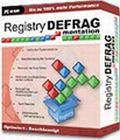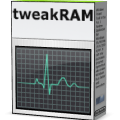Todos os dias oferecemos software com licenças GRATUITAS que do contrário você teria que comprar!

Giveaway of the day — Registry Defragmentation 9.1
Registry Defragmentation 9.1 esteve disponível como oferta em 25 de agosto de 2009
Registry Defragmentation é uma pequena ferramenta que melhora enormemente a performance do seu computador. Ele fisicamente desfragmenta o arquivo de registro do Windows para lhe conceder a estrutura linear correta. Esta ferramenta é absolutamente essencial para quem instala/desinstala novos aplicativos de software com frequência.
"Registry Defragmentation" executa a desfragmentação física do arquivo de registro do Windows. Depois da desfragmentação ele terá a estrutura linear que reduzirá o tempo de resposta e registro de aplicativos. "Registry Defragmentation" também remove inserções não utilizadas, tornando o registro ainda menor em seu tamanho. Não se preocupe se após a desfragmentação o registro diminuir aoenas de 1 a 5%, o segredo não está em seu tamanho mas sim em sua estrutura linear.
Requisitos do Sistema:
Windows 95/98/ME/NT/2000/XP/2003 and Vista
Publicado por:
Elcor SoftwarePágina Oficial:
http://www.elcor.net/rdefrag.phpTamanho do arquivo:
3.37 MB
Preço:
$11.95
Títulos em Destaque

Conserte seu registro e aprimore a performance do seu PC! Seu sistema está se tornando mais lento e instável? Então você de um limpador profissional de registros e reparador de ferramentas. Advanced Registry Doctor é a solução!

Premium Booster irá otimizar seu PC em alguns simples passos. Rapidamente você irá notar que sua mágica realmente funciona e que seu Windows se tornará mais estável se você continuar usando o Premium Booster.

TweakRAM foi desenhado para limpar a memória do seu PC. Ele otimiza a memória RAM para que seu computador rode mais depressa e congele menos, e ainda melhora sua performance ao limpar o conteúdo da RAM.
GIVEAWAY download basket
Comentáriosrios do Registry Defragmentation 9.1
Please add a comment explaining the reason behind your vote.
The Good
* Easy to use.
* Works quickly.
* Can backup and restore registry.
* In-house ability to create and use System Restore points.
* Has a scheduler to allow you to automate tasks.
* Did not mess up my computer after a defrag.
The Bad
* No "analysis" report prior to actual defragmentation.
* Does not warn you to close all programs before you defrag.
* Scheduler is set to run automatically at boot by default.
* Registry backup files are not self-executing (you must have a program that supports the backup format to restore your registry).
* Opens a website in your browser advertising another product during installation.
* Mentions it is for "95-XP" some places and "XP-Vista" other places.
Free Alternatives
TuneUp Utilities 2008 ("TuneUp Registry Defrag" module)
For final verdict, recommdendations, and full review please click here.
Since the website says next to nothing, I read Ashraf's review. I'm giving the same advice I give for most tools which mess with the registry--stay far away from them.
The registry is a specialized database which Windows uses, primarily for Windows and program settings, but applications have been known to put all kinds of stuff in the registry which they aren't supposed to. It's the absolute worst idea which Microsoft ever came up with, apart from Windows itself. The idiots at Microsoft claim that the common database was supposed to provide for ownership and access control, but it fails miserably at both of those. Don't believe me? If there's access control, why are applications allowed to screw up critical registry entries for Windows and other applications? If there's ownership, why does uninstalling programs leave tons of their crap behind in the registry? The whole thing's a fiasco. The issue of ease of application portability (or lack thereof) is actually a very minor issue compared to the rest.
Based on what Registry Defragmentation 9.1 says it does and what Ashraf's review says it does, its documentation is extremely misleading. The registry consists of files, the physical fragmentation of those files is one thing. The registry is a database, the internal structure and fragmentation of the database entries within the physical files is another matter. It's primarily the second issue which Registry Defragmentation addresses, although it implies the first.
I don't care that some people will claim that they've "been using registry tools since they were knee-high and never had a problem". It's an extremely simple matter to determine that the registry is constantly in-use. While there are tools which will track all registry access, both reads and writes, what's relevant are actual changes over time. There are a number of registry snapshot tools, I use a licensed copy of Blue Project SysTracer Pro, an earlier version of which was a previous giveaway. If you take two snapshots over a couple of minutes and compare them, you'll see that all sorts of stuff has changed. Trying to terminate running applications is insufficient. Any utility which modifies the registry as a whole while Windows is running is going to mess stuff up, whether you notice it or not. Such utilities, if used, must be run prior to Windows boot, which Registry Defragmentation 9.1 doesn't do.
There are the issues about whether internal or external registry defragmentation should be done at all. The big-name disk defragmenters (Raxco PerfectDisk, Diskeeper, O&O Defrag, etc.) are all capable of handling the physical defragmentation of the registry and other system files safely. I doubt that they do the internal defragmentation of the database structure, but it's unnecessary, as Windows (at least XP and higher) will handle that automatically as-needed. Unlike Registry Defragmentation 9.1, there are other utilities which will do the internal database defragmentation prior to Windows boot.
Some people are big fans of registry backups. I'm definitely not a fan of all-or-nothing registry restoration, it's guaranteed to screw things up whether you notice or not (again, do traces on a running system and see how much changes, and how rapidly, and don't forget files and the registry have to be kept synchronized). Moderately safe things to do include System Restore (XP and higher), and when desperate, Use Last Known Good Configuration. I do occasional "backups" via SysTracer snapshots. Those let me examine what's changed and specifically select the individual items which I want to restore.
- "Registry Defragmentation is a small utility that does gigantic improvements in computer performance"
Yah, just run it 10 times and presto - your computer is 10 times faster. What a load of rubbish!
The facts are : Most registry optimization programs give very minor (if any) performance improvement. Registry operations, after all, are not the most frequent operation. The registry is a database used to store static date that may fragment over time. Most programs when starting-up do look up some values in the registry, and may also store some values when exiting.
The registry may acquire "holes" when deletes are done, as when one uninstalls a program. But it would require a hell of a lot of such operations to unbalance it so that the difference becomes noticeable. Shrinking the size of the registry by x percent doesn't mean at all that performance is improved by x percent, far from it. The improvement from defragmentation is usually measured in nanoseconds and is really unnoticeable and not worth the risk of rendering the computer unbootable. And no reason to do this more than about once a year.
I really dislike companies trying to profit from the non computer savvy and using scarecrow claims that have no validity at all.
More everyday free alternatives that never time out:
* Free Registry Defrag (can analyze first):
http://www.registry-clean.net/free-registry-defrag.htm
* NTREGOPT (get ERUNT with it to make a backup first):
http://www.larshederer.homepage.t-online.de/erunt/index.htm
The Registry is a dark and densely packed shedful of gelignite.
You may wish to walk into it holding a lighted candle in order to see what's on the shelves and how best to tidy 'em.
Whether or not you walk away unscathed is another matter, because the hot wax dripped by your candle may very well trigger a slow burn rather than an instant explosion.
So although the shed is still intact after your visit, and all your poking around / tidying of its contents, that's actually no guarantee at all: it could blow up in your face some time afterwards.
Though today's ultra-hyped software offering assaults the intelligence with claims of 'gigantic improvements' -- gigantic? What's that then, a factor of 10? 100? 1,000? -- it's ultimately no different to any other app ever marketed: the user must trust in the skill of the creator and hope that there aren't hidden flaws in the build.
Doing that with the non-critical may, just, be OK. But trusting to luck with something as critical as the computer's registry is faith at its most blind.
Reassurance does of course exist where an app has been around a long time -- for example, the freeware optimiser NTREGOPT, as notable for the way it shuns commercial hype as the way it has evolved and been refined thanks to feedback from users worldwide.
Similar reassurance also exists in the form of Revo Uninstaller, which does a great job in cleaning up Registry detritus after every uninstall anyway.
Today's software also seeks to provide that same reassurance too -- yet I don't know what happened to all the preceding versions, even though by implication there must've been a heck of a lot for this ever to have reached the status of build number v9.1.
Nor is it clear why, after all those successive builds, this software continues to be entirely incapable of reporting on the 'state' of the Registry before it even gets to work on it.
Doesn't it know? Can't it tell?
It certainly should, because only a fool consents to surgery without advance diagnosis.
Thanks, then, GOTD, but where today's software is concerned, a definite no thanks.
Whatever version it truly happens to be.


ola bom dia!!!!! pesoal preciso do CIAF MASTER ATIVADO ABRAÇOS
Save | Cancel